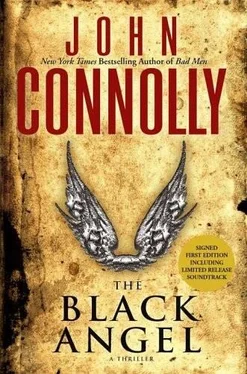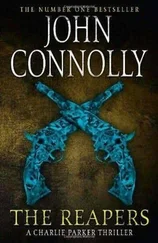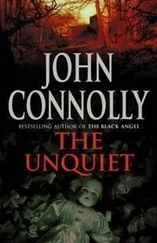“It never left,” he said, almost in wonder.
“Tell me,” said Stuckler. “Please, allow me that much.”
Brightwell squatted, and showed Stuckler the illustration, then rose and nodded to Miss Zahn. Stuckler did not look up as the muzzle of the gun touched the back of his head, its caress almost tender.
“All this time,” he said “All this time.”
Then time, what was and what was yet to be, came to an end, and a new world was born for him.
Two hours later, Reid and Bartek were walking back to their car. They had stopped to eat at a bar just south of Hartford, their last meal together before they were due to leave the country, and Reid had indulged himself, as was sometimes his wont. He was now rubbing his belly and complaining that chili nachos always gave him gas.
“Nobody made you eat them,” said his companion.
“I can’t resist them,” said Reid. “They’re just so alien.”
Bartek’s Chevy was parked on the road, beneath one of a long line of bare trees that filigreed the cars beneath in shadow, part of a small forest that bordered green fields and a distant development of new condos.
“I mean,” Reid continued, “no decent society would even con-”
A shape moved against one of the trees, and in the fraction of a second between awareness and response, Reid could have sworn that it descended down the tree trunk headfirst, like a lizard clinging to the bark.
“Run!” he said. He pushed hard at Bartek, forcing him into the woods, then turned to face the approaching enemy. He heard Bartek call his name, and he shouted: “Run, I said. Run, you bastard!”
There was a man facing him, a small, pie-faced figure in a black jacket and faded denims. Reid recognized him from the bar, and wondered how long they had been watched by their enemies. The man did not have any weapon that Reid could see.
“Come on, then,” said Reid. “I’ll have you.”
He raised his fists and moved sideways, in case the man tried to get past him to follow Bartek, but he stopped short as he became aware of a stench close by.
“Priest,” said the soft voice, and Reid felt the energy drain from him. He turned around. Brightwell was inches from his face. Reid opened his mouth to speak, and the blade entered him so swiftly that all that emerged from his throat was a pained grunt. He heard the small man moving into the undergrowth, following Bartek. A second figure accompanied him: a woman with long dark hair.
“You failed,” said Brightwell.
He drew Reid to him, embracing him with his left arm even as the knife continued to force its way upward. His lips touched Reid’s. The priest tried to bite him, but Brightwell did not relinquish his hold, and he kissed Reid’s mouth as the priest shuddered and died against him.
Miss Zahn and the small man returned after half an hour. Reid’s body already lay concealed in the undergrowth.
“We lost him,” she said.
“No matter,” said Brightwell. “We have bigger fish to fry.”
He stared out into the darkness, as though hoping that despite his words, he might yet have the chance to deal with the younger man. Then, when that hope proved misplaced, he walked with the others back to their car, and they drove south. They had one more call to make.
After a time, a thin figure emerged from the woods. Bartek followed the line of the trees until he found at last the splayed figure, cast aside amid stones and rotten wood, and he gathered the body to him and said the prayers for the dead over his departed friend.
Neddo was seated in the little office at the back of his store. It was almost dawn, and the wind outside rattled the fire escapes. He was hunched over his desk, carefully using a small brush to clean the dust from an ornate bone brooch. The door to his place of work opened, but he did not hear it above the howling of the wind, and so engrossed was he in the delicate task before him that he failed to notice the sound of soft footsteps moving through his store. It was only when the curtain moved, and a shadow fell across him, that he looked up.
Brightwell stood before him. Behind Brightwell was a woman. Her hair was very dark, her shirt was open to her breasts, and her skin was alive with tattooed eyes.
“You’ve been telling tales, Mr. Neddo,” said Brightwell. “We indulged you for too long.”
He shook his head sadly, and the great wattle of flesh at his neck wobbled and rippled.
Neddo put the brush down. His spectacles had a second pair of lenses attached to them by a small metal frame, in order to magnify the piece upon which he was working. The lenses distorted Brightwell’s face, making his eyes seem bigger, his mouth fuller, and the red-and-purple mass above his collar more swollen than ever, so that it appeared to be on the verge of an eruption, a prelude to some great spray of blood and matter that would emerge from deep within Brightwell, burning like acid everything with which it came into contact.
“I did what was right,” said Neddo. “If only for the first time.”
“What were you hoping for? Absolution?”
“Perhaps.”
“ ‘On earth they shall never obtain peace and remission of sin,’” Brightwell recited. “ ‘For they shall not rejoice in their offspring; they shall behold the slaughter of their beloved, shall lament for the destruction of their sons, and shall petition for ever, but shall not obtain mercy and peace.’”
“I know Enoch as well as you, but I am not like you. I believe in the communion of saints, the forgiveness of sinners…”
Brightwell stepped aside, allowing the woman space to enter. Neddo had heard about her but had never seen her. Without fore-knowledge, she might have appeared beautiful to him. Now, facing her at last, he felt only fear, and a terrible tiredness that prevented him from even attempting escape.
“…the resurrection of the body,” Neddo continued, his speech growing faster, “and life everlasting. Amen.”
“You should have remained faithful,” said Brightwell.
“To you? I know what you are. I turned to you out of anger, out of grief. I was mistaken.” Neddo commenced a new prayer: “‘Oh my God, I am heartily sorry for all my sins, because they have offended thee…’”
The woman was examining Neddo’s tools: the scalpels, the small blades. Neddo could hear her working her way through them, but he did not look at her. Instead, he remained intent upon completing his act of contrition, until Brightwell spoke and the words died in Neddo’s mouth.
“We have found it,” said Brightwell.
Neddo stopped praying. Even now, with death so close, and his protests of repentance still wet upon his lips, he could not keep the wonder from his voice.
“Truly?” he said.
“Yes.”
“Where was it? I would like to know.”
“Sedlec,” said Brightwell. “It never left the precincts of the ossuary.”
Neddo removed his glasses. He was smiling.
“All of the searching, and it was there all along.”
His smile grew sad.
“I should like to have seen it,” he said, “to have looked upon it after all that I have heard and all that I have read.”
The woman found a rag. She soaked it with water from a jug, then stepped behind Neddo and forced the material into his mouth. He tried to struggle, pulling at her hands and her hair, but she was too strong. Brightwell joined her, pushing Neddo’s hands down into the chair, his weight and strength keeping the smaller man’s body rigid. The cold of the scalpel touched Neddo’s forehead, and the woman began to cut.
We flew into Prague via London, arriving late in the afternoon. Stuckler was dead. We had hired a car in New York and driven north to his house after our meeting with Bosworth, but by the time we arrived, the police were already there, and a couple of calls confirmed that the collector and his men had all been killed, and that the great bone statue in his treasury now had a hole in its chest. Angel joined us in Boston shortly after, and we left for Europe that night.
Читать дальше












